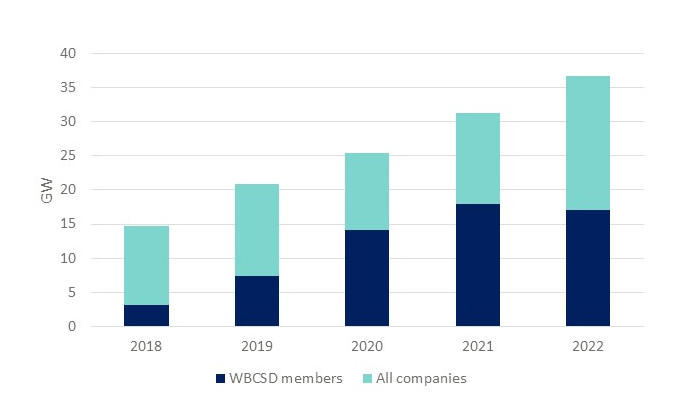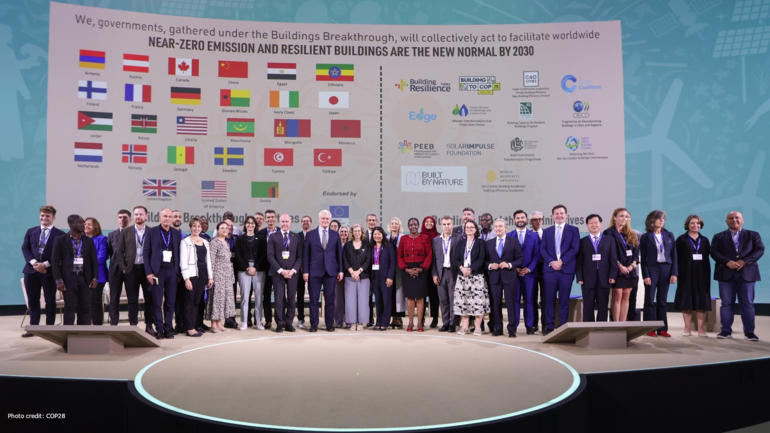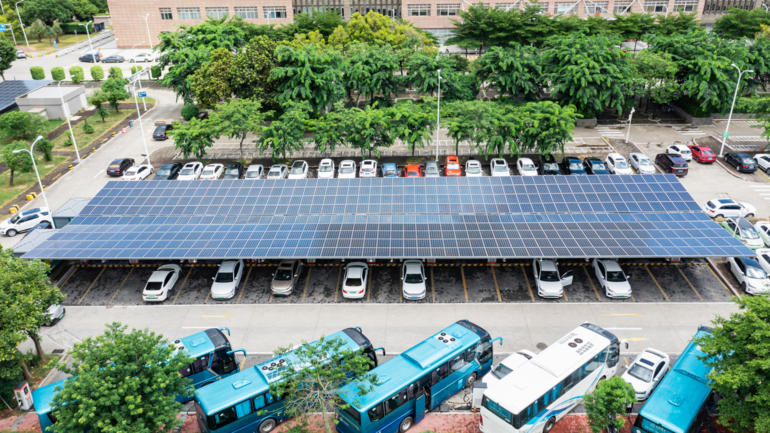Highlights:
- Companies are actively implementing their sustainability ambitions, which has propelled the growth in corporate renewable procurement over the past years.
- Through REscale, WBCSD’s members have driven the transformation of renewable electricity (RE) procurement through power purchase agreements (PPAs), set standards for company leadership and navigated complex hurdles along the way. Find our guidance here.
- We share our latest recommendations for sustainable RE procurement through six leadership strategies.
- We explore what’s next for companies to meet their decarbonization targets by procuring or producing sustainable heat solutions and fuels for their operations.
How REscale ignited the renewable electricity transformation
Over the last decade, corporate renewable electricity procurement globally has grown exponentially – as companies are increasingly acting on their responsibility in solving the climate crisis and learning that doing business sustainably is the only way forward. One of the leading ways for companies to procure renewable power is through power purchase agreement (PPA), which is a contract between the corporate buyer (off-taker) and the power producer (developer, independent power producer, investor) to purchase electricity at pre-agreed prices for pre-agreed periods.
The REscale initiative has been pivotal in propelling this transformation.
It started with one vision: to bring together companies across the renewable electricity value chain to increase understanding and solve common challenges at a time when the corporate RE procurement market was in its infancy. What started with a few companies committing to using 100% renewable electricity in 2015, evolved to hundreds of companies making significant progress in implementation by 2023.
Through collaboration and knowledge sharing in the Global Corporate Renewable PPA Forum, WBCSD members were able to identify barriers, develop solutions & risk mitigation strategies and establish standards & norms for renewable electricity procurement that supported companies around the globe in adopting RE solutions.
The Forum partnered with various lawyers, accountants and consultants to help procurement functions within companies navigate the complexities, including accounting implications and the various pricing structures for corporate PPAs, tackle hurdles like cross-border and multi-technology PPAs, overcome implementation barriers in certain markets like Brazil and India, and founded a number of flagship national and regional PPA forums that explored specific geographical needs (in Argentina, India, Europe, Brazil and South Africa).
In Europe, our joint RE-Source platform achieved remarkable success. Bringing together WindEurope, SolarPower Europe, RE100 and WBCSD with the common goal of opening markets, creating demand and facilitating business opportunities, this growing community also hosts the world's largest annual corporate renewable procurement event. To find out more and get involved, follow the RE-Source platform to get involved.
Over the past 7 years, the REscale initiative has helped members become leaders in RE procurement – not only outpacing other companies but also demonstrating the significance of PPAs in financing and accelerating RE projects (read more here).
Today, WBCSD’s members are responsible for nearly half of around 145 GW of corporate PPAs signed to date. In 2021, WBCSD members sourced an average of 39% of their electricity consumption from renewables, which is equivalent to replacing the capacity of 20 coal power plants.
Contracted capacity of corporate renewable PPAs globally
Source: BloombergNEF, December 2022
"Participating in the WBCSD Global PPA Forum provided an opportunity to network with renewable energy developers, consumers, lenders, law firms and other members of the value chain to help overcome obstacles and accelerate adoption of renewables in our portfolio. These efforts have positioned Dow to operate all its Brazilian sites with renewable power in 2025.” Claudia Schaeffer, Climate Integration Director, Latin America Energy & Climate, Dow
“EY joined the Global PPA Forum in 2015 at a time when corporate PPAs were generally little understood, though we had already signed PPAs in the UK, Mexico and India. We’re proud to have joined the Forum and helped co-author two widely read reports on the topic, bringing greater awareness of how PPAs can help companies manage costs and support their environmental objectives. Looking back on the process, we can see how much we learned, too.” Phil Dominy, Director, Energy & Infrastructure, EY
“Philips was one of the founding members of the WBCSD Global PPA Forum in 2015. Through the Forum, we were able to enhance our collective knowledge through peer-to-peer sharing and to generate new ideas that we have put into action, such as our virtual consortium PPA in Finland. WBCSD and the PPA Forum have been a great lever to deliver solutions in an era where the need for corporate action to reduce global emissions is of the utmost urgency.” Simon Braaksma, Senior Director, Group Sustainability at Royal Philips.
We are immensely proud of what WBCSD and its member companies have achieved and are pleased to see its legacy live on in the flagship national and regional initiatives. Our library of resources remains relevant for companies seeking guidance on how to navigate the challenges and opportunities of RE procurement.
New drivers for leadership in RE procurement
In recent years, best practices in RE procurement have evolved, with leading companies factoring broader sustainability considerations into their procurement strategies – including the impact on the environment, people and nature. Expectations are also growing for companies to go beyond carbon emissions reduction and contribute toward a sustainable power system that is equitable, nature-positive and in line with a 1.5°C scenario.
Based on the new drivers guiding companies to make power procurement decisions, we set out six leadership approaches that go beyond the worthy goal of adding renewable power capacity to the grid that companies can use to evolve their procurement strategies and respond to the risks and opportunities the energy transition presents:
1) Procuring renewable power at the same time it is generated – resulting in a more comprehensive power procurement solution
2) Supporting grid flexibility by preloading or delaying consumption to support the stability of the power grid
3) Integrating an asset’s emission abatement potential into procurement decision-making
4) Using resources and materials sustainably, during development, construction, operation and decommissioning of renewable power procurement projects
5) Ensuring renewable power procurement projects are nature-positive
6) Ensuring renewable power procurement projects support the just energy transition by putting people and communities first
The most appropriate procurement approach depends heavily on the company’s procurement and sustainability strategy, their demand profile, the policy and regulatory frameworks in the markets where they are operating and the availability of each method in these markets.*
Have a look at our report for more information about each of these leadership approaches.
Where do we see corporate renewable procurement going next?
As companies continue to incorporate considerations of climate, society and nature into their electricity procurement decisions and adopt the leadership approaches mentioned above, they will also be guided toward procuring sustainable energy. To reduce emissions and increase business resilience, companies will need to consider all energy uses – electricity, heating and cooling in buildings and industry, and transport – across all assets and geographies; include all relevant internal stakeholders – from procurement and operations through to finance and executive management – and collaborate with external stakeholders, across the supply chain, customers and local end-users.
We are actively focused on bringing together companies to tackle a few of these big sustainable energy procurement challenges: sustainable heat for industry and buildings, and low-carbon hydrogen for hard-to-abate sectors.
Procuring sustainable heat
We are working with members to develop and promote pragmatic corporate guidance enabling light industry companies to accelerate deployment of renewable heat solutions. After providing guidance on attractive markets for renewable heat, industrial heat pumps and heat as a service, we are currently scoping the next area of focus with our members.
For more information on this workstream, please contact Surbhi Singhvi at singhvi@wbcsd.org.
Procuring low-carbon hydrogen
We are working with our members to accelerate the commercial deployment of hydrogen with the lowest possible carbon intensity and promote investment decisions in line with a 1.5°C scenario. We will continue to strengthen the market signal for hydrogen and accelerate the deployment of low-carbon hydrogen projects.
For more information on this workstream, please contact Celine Le Goazigo at legoazigo@wbcsd.org.
New workstream to help energy users navigate complex energy solutions
We are launching a new workstream to provide guidance to corporate energy users to ultimately choose an optimal suite of technologies, business models and financing mechanisms for their energy needs as well as to play their role in solving the systemic challenges of the energy transition related to nature, equality, climate and critical raw materials.
Contact Surbhi Singhvi at singhvi@wbcsd.org to see how you can participate.
Acknowledgments
We would like to thank over 100 companies who actively worked with each other over the past years to accelerate corporate renewable procurement. Equally, we thank the many partners who worked with us in that time: our RE-Source partners (SolarPower Europe, WindEurope, RE100), IRENA, The Climate Group, CEBA, WRI, Eurelectric, GWEC, CDP, CEBDS, CEADS, NBI, BNEF and the We Mean Buisness Coalition. All of the companies and organizations have all been a significant part of the success of WBCSD’s Global PPA Forum
*WBCSD analysis is using data from CDP. Data from CDP and the analysis exclude outliers.









